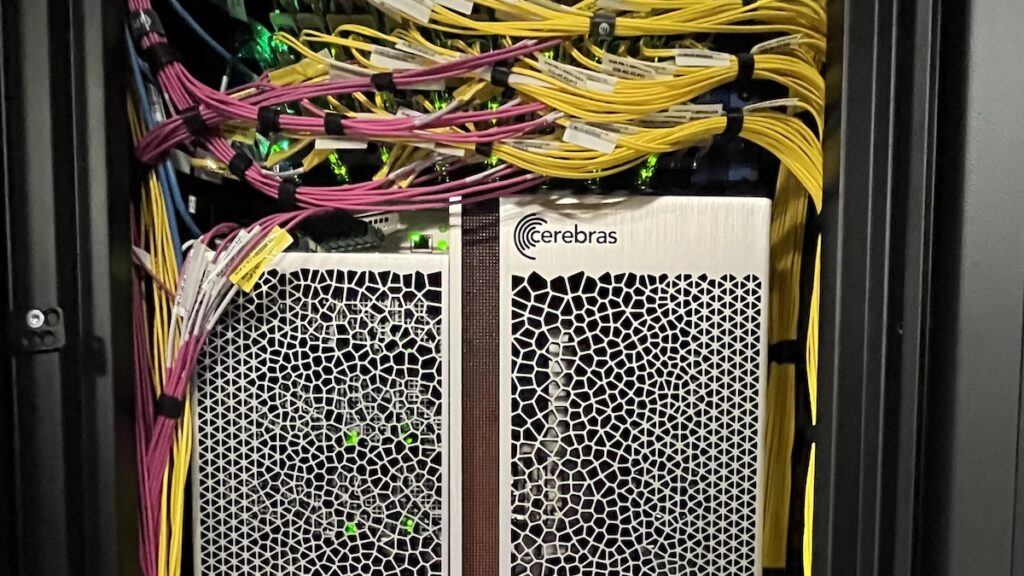A new high performance computing configuration featuring the ‘world’s largest AI chip ever built’ has been installed at a supercomputing centre in Edinburgh.
The cluster, housed at the Edinburgh International Data Facility, consists of four CS-3s using Cerebras’s latest 3rd generation of Wafer Scale Engine processors, making it largest of its kind in Europe.
Researchers will be able to use the new AI service, provided to the Edinburgh and South East Scotland City Region, as part of the Data Driven Innovation programme, which has been led by Edinburgh University since 2018.
Professor Mark Parsons, director of the Edinburgh Parallel Computing Centre (EPCC), which runs the facility, said: “AI is transforming all of our lives, and this investment will help universities, public sector organisations, and companies – large and small – to train and use AI models at speeds and with ease no other AI technologies can match.”
The new service builds on experience EPCC gained with the Cerebras CS-1 and CS-2 systems.
Parsons says: “When we started our collaboration with Cerebras in 2020, the company’s technology focused on training AI models at scale. With the Cerebras CS-3 systems, we can now take advantage of Cerebras AI Inference – the company’s record-breaking inference technology. EPCC has always worked at the leading edge of supercomputing and our investment in this system brings a uniquely powerful AI resource to our region.”
Cerebras’s new CS-3 cluster installed at EPCC is capable of training models up to 240 billion parameters and can be easily extended to 1 trillion. It can fine-tune 70 billion parameter model in a day. Parameters are like the settings or connections in an AI brain — the more you have, the more the model can learn and understand.
The ease of use of Cerebras’s technology also allows for a more democratic approach to AI models – scientists and machine learning practitioners from other disciplines, not only computer science, can start building, training and using models with no need for complex parallel programming. The ability of Cerebras’s technology to scale linearly allows for predictability of the efforts that is unmatched by other technologies.
“We are honoured to expand our multi-year partnership with EPCC with this new CS-3 cluster, which will be a major leap forward in advancing AI research and capabilities in the UK,” said Andrew Feldman, CEO and co-founder of Cerebras.
“EPCC has done pioneering work in enabling the next generation of AI breakthroughs. With our largest installation in the European continent to date, we’re excited to be part of such an important initiative that will enable researchers and institutions to drive innovation and shape the future of AI and high performance computing at a scale previously thought impossible.”
The University of Edinburgh has been a world-leader in AI for the past 60 years. In 1963, Donald Michie established one of the earliest AI research groups at the university, marking the beginning of its long-standing commitment to AI. And since 1990 EPCC has pioneered the use of novel and high-performance computing technologies for the benefit of academia, industry and commerce.
The CS-2 systems at EPCC have already enabled researchers at the university to develop highly optimised ‘wafer-scale inference software’ for large language models (LLMs), to explore their use for biomedical AI, and for local company, smartR AI™ to explore fine-tuning of LLMs on the system. The company has developed a Scottie dog AI assistant called SCOTi – described as ‘your loyal AI pal’ – which can help companies ‘transform’ their productivity.
The EPCC systems have also helped researchers in India to develop an LLM for materials science and, in Switzerland, to adapt LLMs to better support Swiss German dialects. With 3.6 million AI compute cores, the CS-3s will also enable EPCC to continue its AI research into parallelism and energy efficiency.
